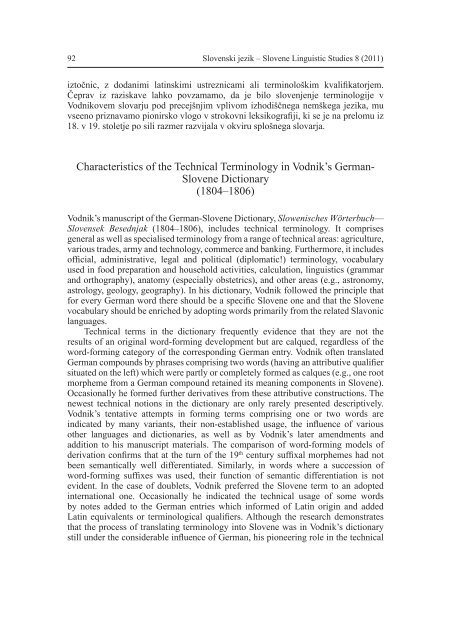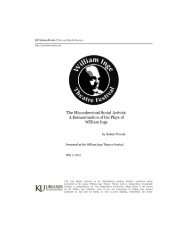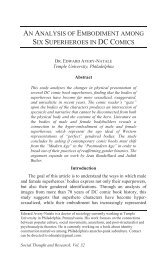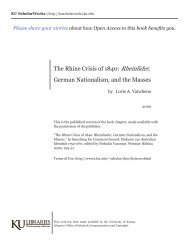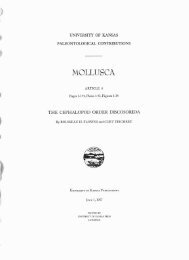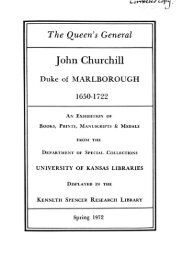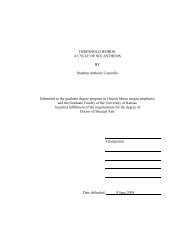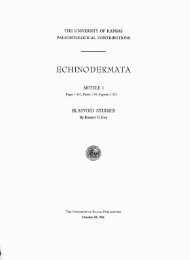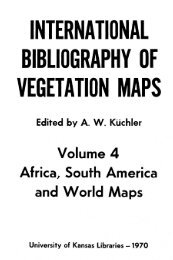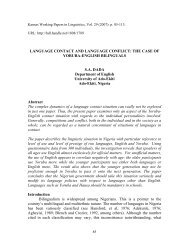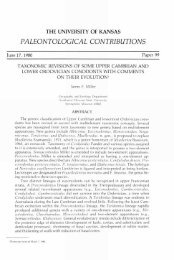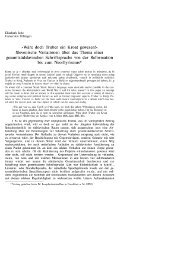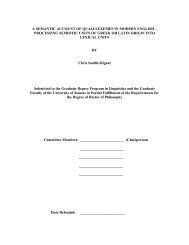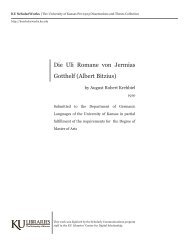Slovenski jezik Slovene Linguistic Studies - KU ScholarWorks
Slovenski jezik Slovene Linguistic Studies - KU ScholarWorks
Slovenski jezik Slovene Linguistic Studies - KU ScholarWorks
You also want an ePaper? Increase the reach of your titles
YUMPU automatically turns print PDFs into web optimized ePapers that Google loves.
92 <strong>Slovenski</strong> <strong>jezik</strong> – <strong>Slovene</strong> <strong>Linguistic</strong> <strong>Studies</strong> 8 (2011)<br />
iztočnic, z dodanimi latinskimi ustreznicami ali terminološkim kvalifikatorjem.<br />
Čeprav iz raziskave lahko povzamamo, da je bilo slovenjenje terminologije v<br />
Vodnikovem slovarju pod precejšnjim vplivom izhodiščnega nemškega <strong>jezik</strong>a, mu<br />
vseeno priznavamo pionirsko vlogo v strokovni leksikografiji, ki se je na prelomu iz<br />
18. v 19. stoletje po sili razmer razvijala v okviru splošnega slovarja.<br />
Characteristics of the Technical Terminology in Vodnik’s German-<br />
<strong>Slovene</strong> Dictionary<br />
(1804–1806)<br />
Vodnik’s manuscript of the German-<strong>Slovene</strong> Dictionary, Slowenisches Wörterbuch—<br />
Slovensek Besednjak (1804–1806), includes technical terminology. It comprises<br />
general as well as specialised terminology from a range of technical areas: agriculture,<br />
various trades, army and technology, commerce and banking. Furthermore, it includes<br />
official, administrative, legal and political (diplomatic!) terminology, vocabulary<br />
used in food preparation and household activities, calculation, linguistics (grammar<br />
and orthography), anatomy (especially obstetrics), and other areas (e.g., astronomy,<br />
astrology, geology, geography). In his dictionary, Vodnik followed the principle that<br />
for every German word there should be a specific <strong>Slovene</strong> one and that the <strong>Slovene</strong><br />
vocabulary should be enriched by adopting words primarily from the related Slavonic<br />
languages.<br />
Technical terms in the dictionary frequently evidence that they are not the<br />
results of an original word-forming development but are calqued, regardless of the<br />
word-forming category of the corresponding German entry. Vodnik often translated<br />
German compounds by phrases comprising two words (having an attributive qualifier<br />
situated on the left) which were partly or completely formed as calques (e.g., one root<br />
morpheme from a German compound retained its meaning components in <strong>Slovene</strong>).<br />
Occasionally he formed further derivatives from these attributive constructions. The<br />
newest technical notions in the dictionary are only rarely presented descriptively.<br />
Vodnik’s tentative attempts in forming terms comprising one or two words are<br />
indicated by many variants, their non-established usage, the influence of various<br />
other languages and dictionaries, as well as by Vodnik’s later amendments and<br />
addition to his manuscript materials. The comparison of word-forming models of<br />
derivation confirms that at the turn of the 19 th century suffixal morphemes had not<br />
been semantically well differentiated. Similarly, in words where a succession of<br />
word-forming suffixes was used, their function of semantic differentiation is not<br />
evident. In the case of doublets, Vodnik preferred the <strong>Slovene</strong> term to an adopted<br />
international one. Occasionally he indicated the technical usage of some words<br />
by notes added to the German entries which informed of Latin origin and added<br />
Latin equivalents or terminological qualifiers. Although the research demonstrates<br />
that the process of translating terminology into <strong>Slovene</strong> was in Vodnik’s dictionary<br />
still under the considerable influence of German, his pioneering role in the technical


